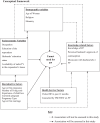Unmet need for family planning among pastoralist community of West Omo zone, Ethiopia: A community based cross-sectional study
- PMID: 39372913
- PMCID: PMC11450574
- DOI: 10.1177/20503121241285657
Unmet need for family planning among pastoralist community of West Omo zone, Ethiopia: A community based cross-sectional study
Abstract
Introduction: Family planning is among the best suggested strategies to decrease the high maternal mortality and morbidity prevailing among pastoral communities. Despite this fact, there is no sufficient information regarding the unmet need for family planning in the study area. Therefore, this study was intended to assess the prevalence of unmet need for family planning and its associated factors among currently married women residing in pastoralist community of West Omo zone, Ethiopia.
Methods: Community-based cross-sectional study was conducted from 01 January to 01 April 2021 in West Omo zone. Five-hundred-sixty currently married women aged 15-49 were interviewed, and the study participants were randomly selected by employing a modified random walk approach. Data were checked manually for completeness and consistency, then entered into Epidata 3.1 and exported to SPSS version 22 for analysis. Multivariate binary logistic regression was used to identify the associated factors, and Adjusted Odds Ratio (AOR) at 95% CI with p-value < 0.05 was considered as significant variables.
Result: A total of 560 currently married women agreed to participate in this study making a response rate of 93.17%. Two hundred three, that is, about 36.3% (95% CI: 32.1, 40.2%) currently married women had an unmet need for family planning, with 119 (58.6%) wishing to delay childbirth and 84 (41.4%) seeking to limit. Have no formal education (AOR = 2.86 (95% CI: 1.61, 5.10)), having poor knowledge of family planning (AOR = 2.83 (95% CI: 1.45, 5.54)), and lack of husband support of family planning (AOR = 2.38 (95% CI: 1.22, 4.67)) are positively associated with unmet need for family planning.
Conclusion: The magnitude of unmet need for family planning in this study is fairly high as compared to previous studies done among non-pastoral community. Hence, it's important to consider the above identified factors while designing effective public health intervention.
Keywords: Ethiopia; Unmet need for family planning; West Omo zone; pastoralist community.
© The Author(s) 2024.
Conflict of interest statement
The author(s) declared no potential conflicts of interest with respect to the research, authorship, and/or publication of this article.
Figures
Similar articles
-
Unmet need for family planning and associated factors among currently married reproductive age women in Tiro Afeta District, South West Ethiopia, 2017: cross-sectional study.BMC Womens Health. 2019 Dec 30;19(1):170. doi: 10.1186/s12905-019-0872-5. BMC Womens Health. 2019. PMID: 31888594 Free PMC article.
-
Eight out of every twenty-five married women have an unmet need for family planning in Meyu Muluke District, Eastern Ethiopia.Sci Rep. 2025 Apr 21;15(1):13761. doi: 10.1038/s41598-025-91297-1. Sci Rep. 2025. PMID: 40258850 Free PMC article.
-
Prevalence and factors associated with unmet need for family planning among the currently married reproductive age women in Shire-Enda- Slassie, Northern West of Tigray, Ethiopia 2015: a community based cross-sectional study.Pan Afr Med J. 2016 Apr 15;23:195. doi: 10.11604/pamj.2016.23.195.8386. eCollection 2016. Pan Afr Med J. 2016. PMID: 27347284 Free PMC article.
-
Determinants of unmet need for family planning among currently married reproductive age women at Dewa Chefa District of Oromia special zone, Amhara region, Ethiopia, 2021; a case-control study.BMC Womens Health. 2024 Feb 8;24(1):103. doi: 10.1186/s12905-024-02939-x. BMC Womens Health. 2024. PMID: 38331764 Free PMC article.
-
Unmet need for family planning among rural married women in Ethiopia: What is the role of the health extension program in reducing unmet need?Reprod Health. 2022 Jan 21;19(1):15. doi: 10.1186/s12978-022-01324-x. Reprod Health. 2022. PMID: 35062951 Free PMC article.
References
-
- UNDESA. World family planning 2022, Meeting the changing needs for family planning: contraceptive use by age and method. New York: United Nations: United Nations. Department of Economic and Social Affairs, Population Division, 2022.
-
- World Health Organization. Family planning. A global handbook for providers, https://www.who.int/publications/i/item/9780999203705 (2018, accessed 01 July 2024).
-
- UN DESA. World family planning 2020 highlights health key findings [Internet]. Geneva, Switzerland: United Nations, https://www.un.org/development/desa/pd/ (2020).
-
- United Nations Department of Economic and Social Affairs, Population Division. World Family Planning 2020 highlights: accelerating action to ensure universal access to family planning (ST/ESA/SER.A/450), 2020.
LinkOut - more resources
Full Text Sources
Miscellaneous



